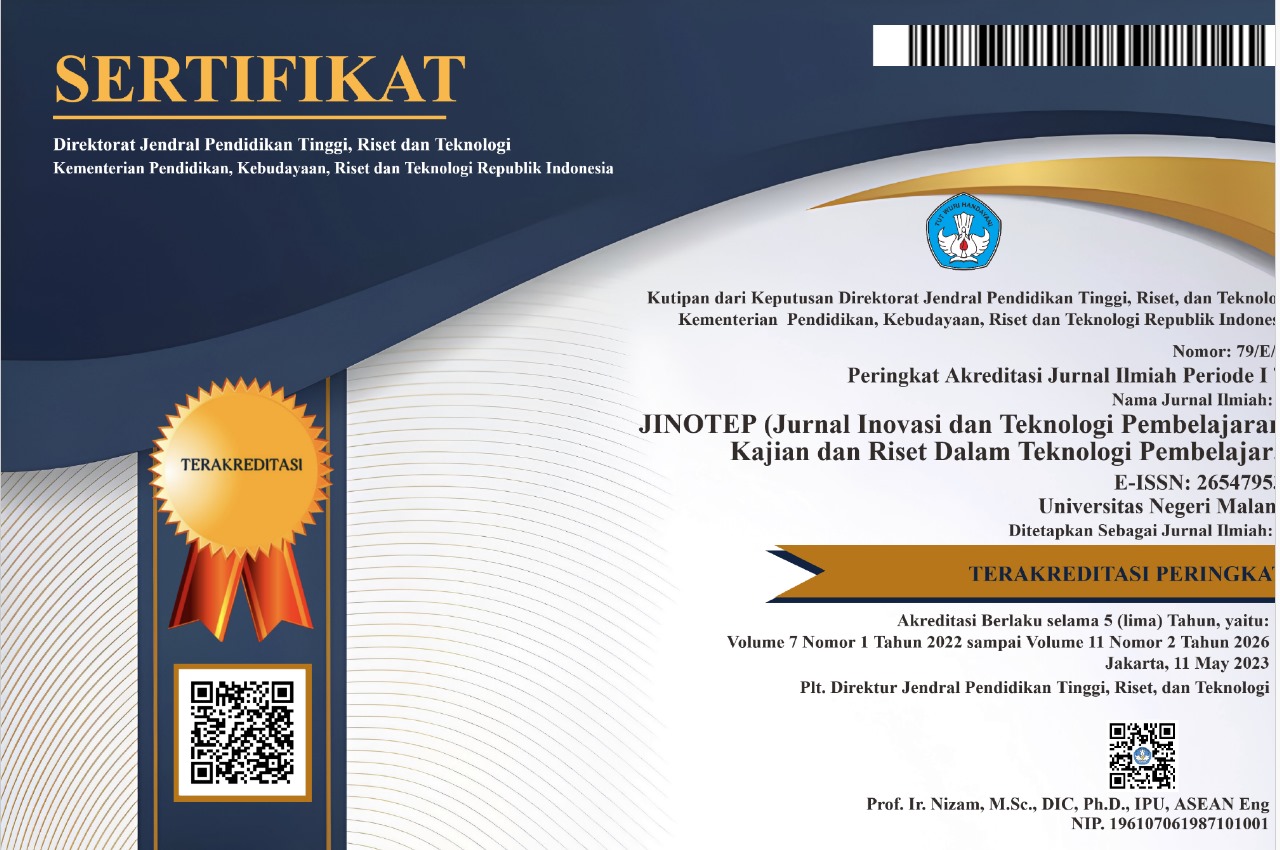Pengembangan E-Modul IPA Berbasis Literasi untuk Mendukung Pembelajaran Daring Bermakna
Abstract
Abstrak: Pengembangan modul ini bertujuan menghasilkan E-modul siswa dan guru berbasis literasi melalui media WhatsApp untuk pembelajaran daring bermakna. Dengan media ini siswa dapat belajar dengan mudah dan bermakna walaupun harus belajar di rumah secara daring. Model pengembangan dengan ADDIE. Adapun langkahnya (1) menganalisis kebutuhan, kurikulum, dan karakter peserta didik, (2) perancangan instrumen penilaian, konten, latihan, dan analisis materi pembelajaran, (3) pengembangan realisasi produk berupa E-modul, (4) menguji coba produk hasil pengembangan. Hasil penelitian validasi ahli materi menunjukkan bahwa rerata 89%. Sedangkan validasi ahli desain buku siswa mencapai 88,5%, buku guru mencapai 92%. Hasil validasi ahli media modul siswa 85% dan buku guru 86,5%. Sedangkan hasil uji coba kelompok kecil mencapai 89,9%. Uji lapangan mencapai hasil rerata 91,0%, dan review teman sejawat mencapai rerata 87,6%. Kesimpulannya adalah pengembangan E-modul IPA Berbasis Literasi melalui media WhatsApp untuk mendukung pembelajaran daring bermakna dikategorikan layak.
Abstract: The development of this module aims to produce literacy-based E-modules for students and teachers through WhatsApp media for meaningful online learning. With this media, students can learn easily and meaningfully even though they have to study at home online. Development model with ADDIE. The steps are (1) analyzing the needs, curriculum, and character of students, (2) designing assessment instruments, content, exercises, and analysis of learning materials, (3) developing product realization in the form of E-modules, (4) testing the product developed. . The results of the material expert validation research show that the average is 89%. While the validation of student book design experts reached 88.5%, teacher books reached 92%. The results of the expert validation of the student module media are 85% and the teacher's book is 86.5%. While the results of the small group trial reached 89.9%. Field trials achieved an average result of 91.0%, and peer reviews reached an average of 87.6%. The conclusion is that the development of Literacy-Based Science E-modules through WhatsApp media to support meaningful online learning is categorized as feasible.
Keywords
Full Text:
PDFReferences
Agustin, N., Susilogati, S., & Addiani, K. (2018). Desain Instrumen Tes Bermuatan Etnosains untuk Mengukur Kemampuan Berpikir Kritis Siswa SMA. Jurnal Inovasi Pendidikan Kimia, 12(2), 2159–2169. https://doi.org/10.15294/jipk.v12i2.15475
Andriani, W., Subandowo, M., Karyono, H., & Gunawan, W. (2021). Learning Loss dalam Pembelajaran Daring di Masa Pandemi Corona. Prosiding Seminar Nasional Teknologi Pembelajaran Universitas Negeri Malang, 2, 485–501.
Atmojo, T., Rochman, C., & Nasrudin, D. (2018). Profil Literasi Konsep Fisika Peserta Didik pada Mitigasi Bencana Hujan Es Antapani. Jurnal Pendidikan Fisika, 6(2), 188–195.
Barrett, P., Davies, F., Zhang, Y., & Barrett, L. (2015). The impact of classroom design on pupils’ learning: Final results of a holistic, multi-level analysis. Building and Environment, 89, 118–133. https://doi.org/10.1016/j.buildenv.2015.02.013
Batubara, H. H., & Ariani, D. N. (2018). Implementasi Program Gerakan Literasi Sekolah Di Sekolah Dasar Negeri Gugus Sungai Miai Banjarmasin. Jurnal Pendidikan Sekolah Dasar, 4(1), 15. https://doi.org/10.30870/jpsd.v4i1.2965
Beschorner, B., & Hutchison, A. (2013). iPads as a literacy teaching tool in early childhood. International Journal of Education in Mathematics, Science and Technology, 1(1), 16–24.
Branch, R. M. (2009). Instructional design: The ADDIE approach (Vol. 722). Springer Science & Business Media.
Bybee, R. W. (2008). Scientific literacy, environmental issues, and PISA 2006: The 2008 Paul F-Brandwein lecture. Journal of Science Education and Technology, 17(6), 566–585. https://doi.org/10.1007/s10956-008-9124-4
Febiharsa, D., & Djuniadi, D. (2018). Pengembangan Media Pembelajaran Interaktif 3 Dimensi untuk Pembelajaran Materi Pengenalan Lingkungan Pada Anak Usia Dini di Indonesia. Journal of Studies in Early Childhood Education (J-SECE). https://doi.org/10.31331/sece.v1i1.590
Febriani, R., Lestari, N. P., & Yuliati, U. (2021). Pendampingan Pengelolaan Digital Marketing Pengusaha Muslim Korwil Dau Malang. Studi Kasus Inovasi Ekonomi, 05(01), 61–66.
Hermawan, A., & Rahayu, T. S. (2020). Penerapan Pendekatan Saintifik dan Model Team Games Tournament Terhadap Motivasi Belajar Siswa Sekolah Dasar. Jurnal Basicedu. https://doi.org/10.31004/basicedu.v4i2.386
Indra, D., Mansyur, U., & Satra, R. (2019). Pemanfaatan Information And Comunication Technology (ICT) Pada SLB Negeri 2 Makassar. Celebes Abdimas: Jurnal Pengabdian Kepada Masyarakat, 1(2), 84–89. https://doi.org/10.37541/celebesabdimas.v1i2.179
Indrayana, B., & Sadikin, A. (2020). Penerapan E-Learning Di Era Revolusi Industri 4 . 0 Untuk Menekan Penyebaran. Indonesion Journal of Sport Science and Coaching, 2(1), 46–55. https://doi.org/10.22437/ijssc.v2i1.9847
Kogoya, D. (2015). Dampak Penggunaan Handphone Pada Masyarakat (Studi pada masyarakat Desa Piungun, kecamatan gamelia, Kabupaten Lanny Jaya Papua). Acta Diurna Komunikasi, 4(4), 141–154.
Li, A., Harries, M., & Ross, L. F. (2020). Reopening K-12 Schools in the Era of Coronavirus Disease 2019: Review of State-Level Guidance Addressing Equity Concerns. Journal of Pediatrics, 227, 38-44.e7. https://doi.org/10.1016/j.jpeds.2020.08.069
Lin, M.-H., & Chen, H. (2017). A study of the effects of digital learning on learning motivation and learning outcome. Eurasia Journal of Mathematics, Science and Technology Education, 13(7), 3553–3564. https://doi.org/10.12973/eurasia.2017.00744a
Mansur, N. (2018). Melatih Literasi Matematika Siswa dengan Soal PISA. Prisma, Prosiding Seminar Nasional Matematika, 1, 140–144.
Nawas, A. (2018). Contextual teaching and learning (ctl) approach through react strategies on improving the students’ critical thinking in writing. https://digital.library.adelaide.edu.au/dspace/handle/2440/124867
Pakpahan, R., & Fitriani, Y. (2020). Analisa Pemafaatan Teknologi Informasi Dalam Pemeblajaran Jarak Jauh Di Tengah Pandemi Virus Corona Covid-19. JISAMAR (Journal of Information System, Applied, Management, Accounting and Researh), 4(2), 30–36.
Pradana, I., Setyosari, P., & Sulthoni, S. (2020). Pengembangan Multimedia Pembelajaran Interaktif Berbasis Android Pada Mata Pelajaran Ilmu Pengetahuan Alam Materi Cahaya. JINOTEP (Jurnal Inovasi Dan Teknologi Pembelajaran): Kajian Dan Riset Dalam Teknologi Pembelajaran, 7(1), 26–32. https://doi.org/10.17977/um031v7i12020p026
Rahmah, N. (2018). Belajar Bermakna Ausubel. Al-Khwarizmi: Jurnal Pendidikan Matematika Dan Ilmu Pengetahuan Alam, 1(1), 43–48. https://doi.org/10.24256/jpmipa.v1i1.54
Smaldino, S. E., Russell, J. D., Heinich, R., & Molenda, M. (2005). Instructional Technology And Media For Learning. 432. https://doi.org/10.1016/J.ARABJC.2011.11.008
Surahman, E., Sulthoni, Wedi, A., & Putra, A. P. (2021). Components and Patterns of Hypercontent Textbook Design as Innovative Learning Resources in Digital Learning Era. The 4th ICSSED, International Conference of Social Science and Education, July 2021, 58–67. https://doi.org/10.2478/9788366675186-008
Surahman, E, Kuswandi, D., Wedi, A., Degeng, I. N. S., Setyanti, D. A., & Thaariq, Z. Z. A. (2019). Adaptive learning analytics management system (Alams): An innovative online learning approach. International Journal of Innovation, Creativity and Change, 5(4), 413–430.
Surahman, Ence, Kuswandi, D., Wedi, A., Thaariq, Z. Z. A., & Diana, R. C. (2019). Model Design of Adaptive Learning Analytics Management System (ALAMS) Using AID Model. The 4th International Conference on Education and Management (COEMA 2019). https://doi.org/10.2991/coema-19.2019.15
Ulfa, S., Fattawi, I., Surahman, E., & Yusuke, H. (2019). Investigating Learners’ Perception of Learning Analytics Dashboard to Improve Learning Interaction in Online Learning System. 2019 5th International Conference on Education and Technology (ICET), 49–54. https://doi.org/10.1109/ICET48172.2019.8987229
Zubaidah, S. (2018). Mengenal 4C: Learning and Innovation Skills Untuk Menghadapi Era Revolusi Industri 4.0. 2nd Science Education National Conference, Oktober, 1–7.
Zulfah, S. (2018). Pengaruh Perkembangan Teknologi Informasi Lingkungan (Studi Kasus Kelurahan Siti Rejo I Medan). Buletin Utama Teknik, 13(2), 143-149.
DOI: http://dx.doi.org/10.17977/um031v9i12022p056
Refbacks
- There are currently no refbacks.
Copyright (c) 2022 Mochamad Zainun Aslik, Hari Karyono, Wawan Gunawan

This work is licensed under a Creative Commons Attribution-ShareAlike 4.0 International License.
======================================================================
Jurnal Inovasi dan Teknologi Pembelajaran published by Universitas Negeri Malang in collaboration with the Asosiasi Program Studi Teknologi Pendidikan Indonesia (APS TPI) and Ikatan Profesi Teknologi Pendidikan Indonesia (IPTPI) with a MoU.
Publisher Address:
Educational Technology Laboratorium, Building D5, 1st Floor
Faculty of Education, Universitas Negeri Malang
Semarang St. No. 5, Malang City, East Java Province, Postal Code 65145
Email: jinotep.fip@um.ac.id
======================================================================

JINOTEP is licensed under a Creative Commons Attribution-ShareAlike 4.0 International License.
JINOTEP Statistics (Since July 13th, 2020)



.png)




.png)
1.png)
1.png)
4.png)
2.png)
1.png)
1.png)
.png)


_3.png)





1.png)
.png)